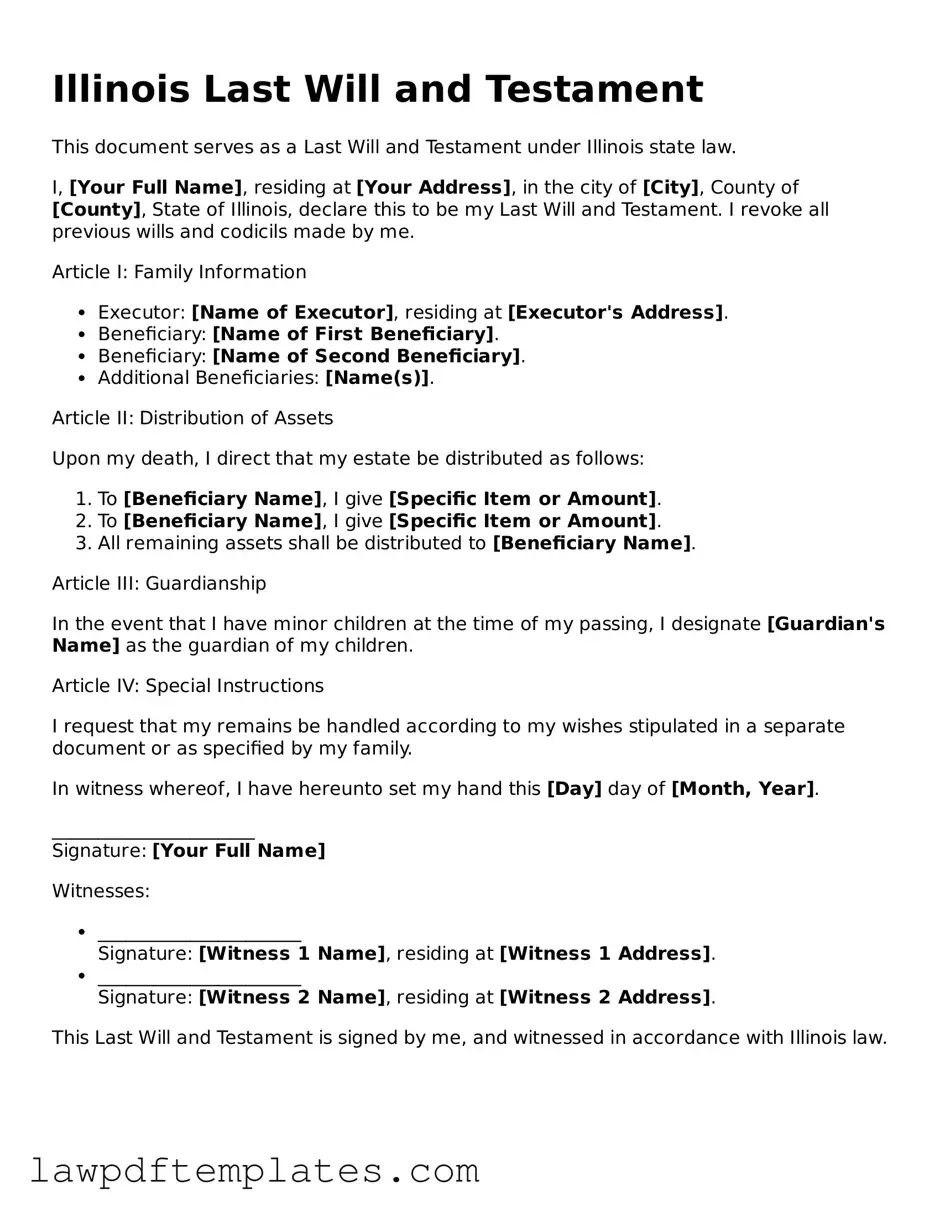Free Last Will and Testament Template for the State of Illinois
Form Breakdown
| Fact Name | Details |
|---|---|
| Governing Law | The Illinois Last Will and Testament is governed by the Illinois Probate Act, 755 ILCS 5/1-1 et seq. |
| Age Requirement | Individuals must be at least 18 years old to create a valid will in Illinois. |
| Witness Requirement | A will must be signed by at least two witnesses who are present at the same time. |
| Revocation | A will can be revoked by creating a new will or by physically destroying the existing will. |
| Self-Proving Will | Illinois allows for a self-proving will, which simplifies the probate process. |
| Holographic Wills | Holographic wills (handwritten) are recognized in Illinois if they are signed and dated by the testator. |
| Residency | Any person can create a will in Illinois, regardless of their state of residence. |
| Executor Appointment | The testator can appoint an executor to manage the estate and ensure the will is executed as intended. |
Sample - Illinois Last Will and Testament Form
Illinois Last Will and Testament
This document serves as a Last Will and Testament under Illinois state law.
I, [Your Full Name], residing at [Your Address], in the city of [City], County of [County], State of Illinois, declare this to be my Last Will and Testament. I revoke all previous wills and codicils made by me.
Article I: Family Information
- Executor: [Name of Executor], residing at [Executor's Address].
- Beneficiary: [Name of First Beneficiary].
- Beneficiary: [Name of Second Beneficiary].
- Additional Beneficiaries: [Name(s)].
Article II: Distribution of Assets
Upon my death, I direct that my estate be distributed as follows:
- To [Beneficiary Name], I give [Specific Item or Amount].
- To [Beneficiary Name], I give [Specific Item or Amount].
- All remaining assets shall be distributed to [Beneficiary Name].
Article III: Guardianship
In the event that I have minor children at the time of my passing, I designate [Guardian's Name] as the guardian of my children.
Article IV: Special Instructions
I request that my remains be handled according to my wishes stipulated in a separate document or as specified by my family.
In witness whereof, I have hereunto set my hand this [Day] day of [Month, Year].
______________________
Signature: [Your Full Name]
Witnesses:
- ______________________
Signature: [Witness 1 Name], residing at [Witness 1 Address]. - ______________________
Signature: [Witness 2 Name], residing at [Witness 2 Address].
This Last Will and Testament is signed by me, and witnessed in accordance with Illinois law.
Common mistakes
Filling out the Illinois Last Will and Testament form can be a straightforward process, but many individuals make common mistakes that can lead to complications. One prevalent error is failing to properly identify the testator. It is essential to clearly state the full legal name and address of the person creating the will. Omitting this information can cause confusion and may render the document invalid.
Another mistake involves not including a statement of revocation for any prior wills. If an individual has created previous wills, it is crucial to explicitly revoke them in the new document. This ensures that there is no ambiguity regarding which will is the most current and valid.
Many people neglect to appoint an executor. The executor is responsible for managing the estate and ensuring that the testator's wishes are fulfilled. Without this designation, the court may appoint someone who may not align with the testator's intentions, leading to potential disputes among beneficiaries.
Inaccurate or incomplete beneficiary designations also pose a significant risk. Individuals should ensure that all beneficiaries are named clearly, including their full names and relationships to the testator. Failing to do so can create challenges in distributing assets and may lead to unintended consequences.
Another common error is not specifying how debts and taxes will be handled. It is important to outline how any outstanding debts or taxes will be paid from the estate before distributing assets to beneficiaries. This oversight can lead to confusion and potential legal issues down the line.
Signatures are critical in validating a will. Some individuals forget to sign their will or do not have the required witnesses present during the signing. In Illinois, two witnesses must sign the document in the presence of the testator. Without these signatures, the will may not hold up in court.
Failing to date the will is another mistake that can have serious implications. A date provides clarity regarding when the will was created and can help establish its validity in relation to any previous wills. Without a date, it may be difficult to determine which document is the most current.
Finally, individuals often overlook the importance of storing the will in a safe and accessible location. A will that cannot be found after the testator's passing can lead to complications and disputes among family members. Proper storage ensures that the document can be located and executed as intended.
Discover More Last Will and Testament Templates for Specific States
Living Will Form New Jersey - Gives you control over who receives your possessions.
When engaging in the sale or purchase of a vehicle, it is crucial to have a formal agreement in place, such as a Florida Motor Vehicle Bill of Sale form, which can be easily obtained from resources like Fast PDF Templates. This document not only outlines the specifics of the transaction but also serves as a vital record for both the seller and the buyer to prevent any future disputes.
Last Will and Testament Michigan - Can clarify intentions regarding jointly owned property.
Will Template Arizona - Essential for anyone looking to ensure their final wishes are formally recorded.
